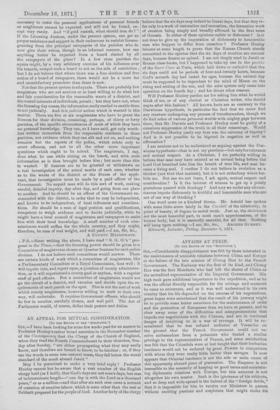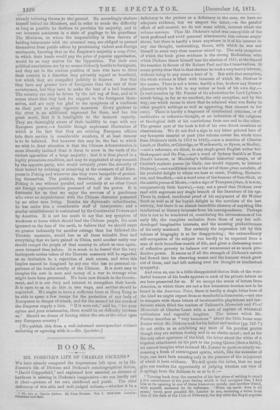AFFAIRS AT PEKIN.
[TO THE EDITOR OF THE "EPECT1TOR,"]
SIR,—Cousidarable disappointment was felt by those interested in the maintenance of amicable relations between China and Europe at the failure of the late mission of Chung Hon to the French Government. The Embassy was the first of its kind, and Chung Hou was the first Mandarin who had left the shores of China as the accredited representative of the Imperial Government. His high rank gave additional importance to the expedition, and as he was the official directly responsible for the outrage and massacre he came to extenuate, and as it was well understood in his own country that his life depended on the success of his negotiations, great hopes were entertained that the result of his journey might be to provide some better assurance for the maintenance of order and the protection of Europeans than we have at present, and to clear away some of the difficulties and misapprehensions that impede our negotiations with the Chinese, and are in continual danger of involving us in a war of revenge. It will be re- membered that he was refused audience at Versailles on the ground that the French Government could not re- ceive ambassadors from a potentate who denied a similar privilege to the representatives of France, and some satisfaction was felt that the Celestials were at last taught that their barbarian insolence would not be endured by great Powers in comparison with whom they were really little better than savages. It now appears that Oriental insolence is not the sole or main cause of this apparently absurd piece of pretension. The Emperor is not insensible to the necessity of keeping on good terms and maintain- ing diplomatic relations with Europe, but this autocrat is not altogether his own master. Such is the ignorance of his subjects, and so deep and wide-spread is the hatred of the " foreign devils," that it is impossible for him to receive our Ministers in person without exciting passions and suspicions that might shake his
already tottering throne to the' ground. He accordingly shelters himself behind his Ministers, and in order to evade the difficulty as long as possible he declines to proclaim his majority, arid in our interests continues in a state of pupilage to his guardians. The Ministers, on whom the responsibility is thus thrown of holding intercourse with the accursed race, are obliged to protect themselves from public odium by proclaiming violent anti-foreign sentiments, knowing that on the Emperor's majority a coup d'etat, in which their heads would pay the price of popular approbation, would be an easy matter for the Opposition. Yet their own political convictions are by no means violently hostile to foreigners, and they are in the curious position of men who have to drive their country in a direction they privately regard as beneficial, but which they are compelled publicly to disavow. Not that they have any greater love of foreigners than the rest of their countrymen, but they have to make the best of a bad business. The country can only be driven by the red rag of fear, and so it comes about that they look for support to the foreigners them- selves, and are only too glad to see symptoms of a readiness on their part to adopt vigorous measures. Every gunboat in the river is an additional argument for them, and has this great merit, that it is intelligible to the meanest capacity. They are thoroughly aware of their inability to cope with any European power,—a forcible though unpleasant illustration of which is the fact that they are enticing European officers into their service in considerable numbers, if at least rumour is to be believed. But however this may be, the fact to which we wish to draw attention is that the Chinese Administration is more liberally inclined than it dares to avow in the teeth of the violent opposition of a large majority ; that it is thus placed in a highly precarious condition, and may be supplanted at any moment by the opposite party, who would certainly prove the sincerity of their hatred by ordering or conniving at the massacre of all Euro- peans in Peking and wherever else they were incapable of protect- ing themselves. The position, therefore, of our Ministers at Peking is one without parallel, and certainly at no other Court are foreign representatives possessed of half the power. It is fortunate for us that we enjoy the services of a gentleman who owns an acquaintance with the Chinese character possessed by no other man living. Besides his diplomatic subordinates, he has under him a considerable staff of interpreters ; and a similar establishment is maintained by the Continental Powers and by America. It is not too much to say that any symptom of weakness at home which should lead the Chinese people, the most ignorant on the face of the earth, to believe that we should exact no greater indemnity for another outrage than has followed the Tientsin massacre, would lose us all these valuable lives and everything that we have gained in China, until another costly war should compel the people of that country to admit us once again, more detested thanbefore. It is much to be feared that the very inadequate notice taken of the Tientsin massacre will be regarded as an invitation to a repetition of such scenes, and what this implies cannot be imagined by any one who has no personal ex- perience of the bestial cruelty of the Chinese. It is more easy to imagine the cost in men and money of a war to revenge what might have been prevented. We have now friends in the Govern- ment, and it is our duty and interest to strengthen their bands. It is open to us to do this in two ways, and neither should be neglected. We ought to have a sufficient force at Hong Kong to be able to spare a few troops for the protection of any body of Europeans in danger of attack, and for the second let the words of the Emperor supply a hint. " If it were not," said he, " for your opium and your missionaries, there would be no difficulty between us." Should we dream of forcing either the one or the other upon any European country ?
[We publish this from a well-informed correspondent without endorsing or agreeing with it.—En. Spectator.]











































 Previous page
Previous page